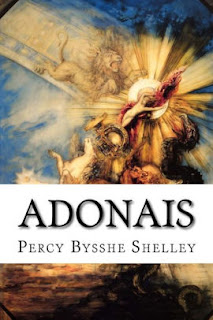“Adonais”
by P.B. Shelley is a pastoral elegy. It is considered to be one of the best
elegies in the English literature. Shelley wrote this elegy mourning the death of
John Keats. The entire elegy can be divided into two parts. In the first 37
stanzas, Shelley mourns Keats’ death. He then talks about nature mourning
Keats’ death, and how human emotions, thoughts, ideas and dead poets come to
see the dead Keats. He attacks the critics whom he believed to have caused
Keats’ early death. He says that this world is a cruel place for talented men
like Keats and himself. However, in the last 17 stanzas, he gives readers hope
and says that Keats did not die but joined the greatest poets. He will remain
in this earth, in nature and among the people.
In
the last 17 stanzas, Shelley gives hope to his readers. He tells them not to
mourn the death of Keats for he has gone to a place where savage critics will
not be able to attack him. He has joined the great poets who joined the
illustrious dead. Keats body will be consumed by earth but his pure spirit will
be part of the divine spirit. The divine spirit is eternal and do not change
with time. Keats spirit will join this eternal divine spirit and the critics
who attacked him will die in shame.
Shelley
further says that Keats’ life in this world was not a life but a sleep; a
dream. After his death, Keats or Adonais has woken up from that dream. It is
the ordinary people who lead a meaningless life on this earth by fighting
meaningless illusions. Keats has gone to a place where there is no jealousy,
slander, hate and pain.
Once
again Shelley personifies the nature and tells it not to mourn Adonais or
Keats’ death. He tells “Young Dawn” to turn all his dew into something
glittering and glorious. A great spirit like that of Keats can never die. It is
death who has died.
Finally,
Shelley declares-
“He is made one with Nature. There is heard
His voice in all her music, from the moan
Of thunder to the song of night's sweet bird.
He is a presence to be felt and known
In darkness and in light, from herb and stone”
Shelley
believes in Pantheism. He believes that Keats has now become one with the
nature. He has not died. His voice can be heard in all the sounds of nature-
thunder’s moan and birds’ music. He has become part of the Spirit of beauty to
which he once contributed to during his life on earth.
Shelley
says that great poets are like stars. Their lights may dim but never
extinguishes. Many great poets, including Shelley himself, who did not find
fame in their lifetime but eventually they became famous. Their thoughts and
ideas always inspire the young minds and lift them from their earthly thoughts.
All the great poets, who died young age, have risen up to greet Keats or
Adonais. Shelley visualizes that Thomas Chatterton, Sir Philip Sydney, Lucan,
the Roman poet, all rose up in Keats’ honor.
Keats
again scolds readers for mourning Keats’ death. Shelley tells him to conceive
the greatness of the vast space and then shrink back to his daily life. He
tells the mourner not to be afraid of death but to lead a cheerful life by
accepting death.
Shelley
then tells the readers to go to Rome, which contains tombs of many great kings
of the world who conquered and caused untold misery and death on earth. Keats
is lying there in cemetery. People like Keats do not need glory but they lend
glory to other people. In the same manner, Keats’ burial has given Rome a
splendor. Kings and conquerors perish and sink in oblivion but great poets and
intellectuals who stood up and fought against the decay of their time will
never be forgotten.
Shelley
then talks about the ruins of Rome which is lying bare for many years. As a
result, grass and flowers have grown over them. The ruins are big and calm and
quiet. Going there one would have strange feelings. Shelley refers this as the
“Spirit of the spot”. The tomb of Caius Cestius is located nearby. It is a
pyramid made of stone. Beating the decaying force of time, the pyramid is
standing there in a majestic manner. The spirit will guide the readers through
the place and would lead him to a cemetery filled with green grass. Along with
the grasses there are flowers grown over the graves. These flowers would look
like laughing infants. It is there Keats is being buried. The reader should
stand there for a moment. The surrounding graves are the graves of people who
died recently.
In
the end, Shelley once again feels the presence of the Eternal spirit and
accepts his death. He feels that he has no hope or desire to live in this
world. He finds no attraction in this world. Even the people he loved gives him
trouble. He feels like the sky is smiling upon him and airs are whispering in
his ears. He felt like Keats is telling Shelley to join with him. Shelley is
not afraid of death but thinking that life is keeping him away from Keats or
Adonais.




No comments:
Post a Comment